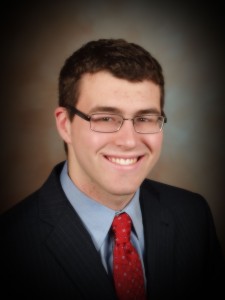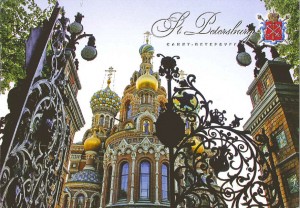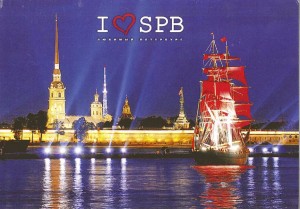Name: Vincent Dour
E-mail: vdour@nd.edu
Location of Study: St. Petersburg, Russia
Program of Study: University of Arizona Russian Abroad Program
Sponsors: Bruce Broillet & Earl Linehan
A brief personal bio:
My name is Vincent Dour and I am originally from Bremerton, WA. I am a rising sophomore in the College of Business, planning on double majoring in Finance and Economics with a prospective supplementary major or minor in Russian. I am an Eagle Scout, former president of my high school, and captain of my school’s sailing team. I absolutely love studying other languages and immersing myself in them. In high school I took German and studied abroad for the summer in southern Germany after junior year. I started taking Russian at Notre Dame and have grown to love it. I know this summer will be an enriching experience and will greatly improve my Russian.
Why this summer language abroad opportunity is important to me:
As a double major, I am ensured a locked in schedule to get my degree over the next few years. Summer study abroad is the best way for me to pursue greater fluency and depth in the language. The program I seek to enroll in satisfies my needs academically and immerses me in an incredible amount of culture as well. There is also a chance that this summer could convince me to pursue the supplementary major in Russian. I currently do not have the background to know if this is something I could study for three more years until I experience Russia for myself. Also, the only way it would even be possible to achieve is because of my grant.
What I hope to achieve as a result of this summer study abroad experience:
I hope to achieve a greater degree of proficiency and fluency through my summer abroad experience. I think speaking only Russian and living with a Russian family will really help this and the grant facilitates that. There is no way I could afford to do the program otherwise. I will also be in St. Petersburg, which is a cultural metropolis for Russia since the time of Tsar Peter I. The grant will allow me to immerse myself in all the culture through the museums, architecture and statues. Visiting all the historical and cultural sites is much more enriching than looking at pictures and reading about them at home. I also really want to make Russian friends. Some of my best friends are the people I met in Germany and to make similar friendships in Russia would be wonderful and a great way to maintain my Russian.
My specific learning goals for language and intercultural learning this summer:
- At the end of the summer, I will to be able to hold a conversation in Russian with my professor.
- At the end of the summer, my Russian will flow more and I will stutter less.
- At the end of the summer, I want to be able to explain how Russians view certain topics and how Russian culture impacts these views.
My plan for maximizing my international language learning experience:
I intend to speak only Russian whenever possible, in both public and private scenarios. In addition to class learning, I will to complement my experience with cultural involvement in order to understand Russian culture and history better. My program offers weekly local trips that I absolutely intend to attend. These include trips to museums, art galleries, and city landmarks. I will make the most of my time there so I plan to get involved with any clubs at the university, especially service ones that would allow me to give back to the St. Petersburg community during my time there. The Messia program working with street children and the Club of Volunteer organizations in St. Petersburg both look like organizations that I could help with while over there. Both of these would allow me to do good works in the world and immerse myself in the language.
Reflective Journal Entry 1:
I’ve been in St. Petersburg for a week now. I landed on Sunday night and the bus driver dropped each of us at our apartments. My host mother Liudmila Rosenskaya and her husband Andrei are wonderful. I get to walk through the city and then take the metro to get to school at the Smolney Institute. The school is beautiful, connected to Rastrelli’s Smolney Cathedral. My peers come from schools all around the country so I get to find out how college and the Russian programs are at other schools. This week we took a bus tour of the city, seeing Nevsky Prospect, the Cathedral of the Spilt Blood, the Kazan Cathedral, and the Admiralty. The city is more beautiful than I ever though Russia could be. My teachers and classes are excellent. I have courses in Phonetics, Grammar, Conversation, Choir, and Politics. Each one is very stimulating, including a lecture on Putin’s Russia. My Russian already seems better, speaking with so many locals is making it come a lot more natural. I’m so excited for the rest of my time here.
Reflective Journal Entry 2:
I just got back from my trip to the city of Novgorod, a few hours out of the city. We got a bus chartered for us to drive us there and the trip itself was very interesting. For one, the countryside of Russia is gorgeous. Coming from the Pacific Northwest, I’m difficult to impress when it comes to other region’s scenery, but Russia impressed me from the little I saw. Secondly, the living conditions outside the city are so different. There is no cell service, the roads are badly paved, and apparently no plumbing in many of the towns. From what my program director told me, the rural areas are very backward with the times. A lot don’t even own cars. It all surprised me coming from living in St. Petersburg. Novgorod is the first established city in Russia that survived the Mongol hordes. We got to see some 800 year old churches and see a walled city. We were treated to a 4-course meal that included traditional Russian dishes such as borsch and pickled cabbage salad. Surprisingly it was all actually very good. On the way back, we stopped at the edge of the city to visit the cemetery of the siege of Leningrad. It was beautifully laid out and a sobering experience that really made the scale of the siege sink in. There are mass graves everywhere along with individual ones laid out kind of like Arlington Cemetery in VA. We watched a video about the siege and got to see pictures of Nevsky Prospect, the main street, before WWII, which was interesting. Overall it was a very good week and nice to see some different sides to Russia than the present or tsarist era churches.
Reflective Journal Entry 3:
When I spoke to my host family about their attitude about the US, they seemed generally positive. Though they had grown up during the Cold War, I couldn’t detect any anti-Western attitudes. My host mom loved France and Europe and a lesser version of that seemed to extend to the West. They didn’t really know policy issues specifically, at least not to a degree we could intelligently talk about with my level of Russian. They both liked President Obama. Western culture wasn’t really a part of their lives because they don’t go to the movies much and neither speaks a word of English. The other person I talked to for a while was my friend Olga. We met Olga at the airport when our program director was running late and we didn’t have a phone to call him. She is a native Russian but speaks English fluently. We hung out with her one weekend and after talking to her and her friends, it seems like the younger generation in St. Petersburg admires the US. Olga had been to Washington, D.C. and loved her experience. She hoped to move there in the future. She liked most U.S. policy and liked President Obama as well, so that may be prevalent. I don’t think my values influenced my perception of their responses, but their answers may have been more pro-Western than they are since they might not have wanted to offend me. Overall, though the government of Russia may not be the most pro-Western, the people seem to be generally positive.
Reflective Journal Entry 4:
When I spoke to my host family about their attitude about the US, they seemed generally positive. Though they had grown up during the Cold War, I couldn’t detect any anti-Western attitudes. My host mom loved France and Europe and a lesser version of that seemed to extend to the West. They didn’t really know policy issues specifically, at least not to a degree we could intelligently talk about with my level of Russian. They both liked President Obama. Western culture wasn’t really a part of their lives because they don’t go to the movies much and neither speaks a word of English. The other person I talked to for a while was my friend Olga. We met Olga at the airport when our program director was running late and we didn’t have a phone to call him. She is a native Russian but speaks English fluently. We hung out with her one weekend and after talking to her and her friends, it seems like the younger generation in St. Petersburg admires the US. Olga had been to Washington, D.C. and loved her experience. She hoped to move there in the future. She liked most U.S. policy and liked President Obama as well, so that may be prevalent. I don’t think my values influenced my perception of their responses, but their answers may have been more pro-Western than they are since they might not have wanted to offend me. Overall, though the government of Russia may not be the most pro-Western, the people seem to be generally positive.
Reflective Journal Entry 5:
Russia’s tolerance and attitudes towards ethnic and racial minorities seems atrocious from my time there. St. Petersburg itself was one of the least diverse environments I’ve ever witnessed. The main group that Russian’s seemed to discriminate against was people from the Caucasus regions. When shopping for a phone the first week, my friends and I befriended the clerk, a Georgian man named Karill who wanted to improve his English. We talked with him at a bar later that night, us in Russian and him in English, and he touched on the fact that Russians can be very racist, mostly when it comes to employment and general manners from the older generation. Given, he was only one person and therefore it could be less severe than he described. However, one of my professors mentioned during a lecture that the situation is pretty bad. Due to the lack of diversity, the only other person I could find to ask was an African-American exchange student we met that had been in St. Petersburg for a semester. He said that he definitely felt like more of a minority and that people looked at him differently in the less touristy locations. Other than that, he said he never experienced any outright discrimination during his time there.
Reflective Journal Entry 6:
I only have a few days left in Russia before I fly back. My time here has been life-changing. The friends I’ve made will be ones I have for life, and I plan on skyping with them over the year to help keep up our Russian gains. My host family is truly a family and they’ve already offered for me to stay with them next time I’m in the city. My Russian is substantially better, especially conversationally. I can easily get directions and tell anyone what I’m doing or have done. My ability to understand native speakers is definitely stronger. The first few weeks, my host mom had to repeat herself a few times for me to understand her but by now I can keep up just fine. My classes were great. Choir I was initially skeptical about, but singing Russian really helps reading comprehension. We started with folk songs such as Ochi Chornia and moved on to the national anthem. I think I might do Russian ensemble when I get back. The way classes are set up still confuses me, with different classes during random periods but it definitely kept things mixed up. I fell in love with this city, and I hope that I get the chance to come back.
Postcard(s) from Abroad:
Reflection on my language learning and intercultural gains:
My summer in St. Petersburg helped my language acquisition immensely. Living with a host family that spoke zero English sped up the process a good amount. It gave me insight to the mass amount of vocabulary there is that there is never time to teach in classes. I learned countless specific nouns and verbs from my host mom that I never even knew I needed. Cultural differences at home were a big obstacle. Basic things such as wearing house slippers at all times to being charged for insignificant amounts of things (paying for wifi when it is provided for the apartment complex, paying for a single piece of bread, etc.) took some getting used to and were a constant reminder that I wasn’t still in the States. Eventually though, I learned to work with the existing culture and explain my confusion to my host parents and Russians I met outside of home. I feel like I met my language acquisition goals sufficiently. I understand spoken Russian better and I think my ability to speak quickly and effectively is much better.
Reflection on my summer language abroad experience overall:
As a result of my time in St. Petersburg with my SLA Grant, my perception of the country as a whole is changed and my desire to further my Russian learning. I still had a very Cold War mindset of Russia, but actually living in country for the summer changed that. St. Petersburg is the most colorful, extravagant, and pleasant city I’ve ever been to. My perception altered as I met Russians who loved the USA and as I participated in the booming market economy in place. Also, hearing native Russians speak the language made me realize how beautiful the language itself could sound. My advice for anyone applying for an SLA grant is to make the most of your time there and see more than what is in the tour books. The landmarks are filled with tourists frequently and exploring less traditional places can help a lot. Summer language study is an invaluable experience.
How I plan to use my language and intercultural competences in the future:
From here I want to ensure I don’t lose any of the Russian I picked up. I am enrolled in both the Intermediate Russian class and a literature class focused on the effect of St. Petersburg on Russian authors in order to learn more and apply what I learned about the city in my time there. I am planning on a Russian minor. I think the Russian department here will help me immensely in maintaining my language ability. If possible, I’d love to go somewhere next summer for a business internship or more study abroad. Professionally, I hope it will help me secure a job with an international business firm to show my experience abroad.



